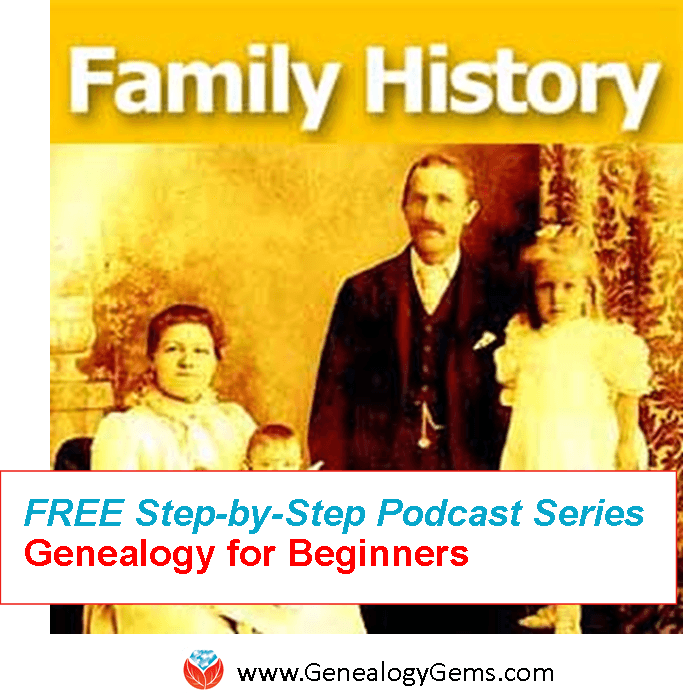Family History: Genealogy Made Easy Podcast
with Lisa Louise Cooke
Republished June 3, 2014

Listen to the Family History: Genealogy Made Easy podcast by Lisa Louise Cooke. It’s a great series for learning the research ropes and well as refreshing your skills.
Download the Show Notes for this Episode
Welcome to this step-by-step series for beginning genealogists—and more experienced ones who want to brush up or learn something new. I first ran this series in 2008-09. So many people have asked about it, I’m bringing it back in weekly segments.
Episode 34: Do Your Genealogy at the Public Library, Part 1
Did you know there is a gem of a genealogical resource right in your own backyard? Well, at least in your own neighborhood—and also in just about every neighborhood where your ancestors lived. The public library is one of the most underestimated sources of genealogical information around! It’s free. It has better hours than most government-run agencies. There are staff with research skills, knowledge of their locale and knowledge about their collections. I have invited Patricia Van Skaik, Manager of the History and Genealogy Department of the Public Library of Cincinnati and Hamilton County to join us here on the podcast. In this episode she’s going to give us the inside scoop on the unique genealogical resources that are tucked away in public libraries just waiting to be discovered.
What’s at the library?
Each library has unique materials for its locale. Examples include:
- City directories
- Maps
- Obituary indexes
- Partnerships with local societies and clubs, and organizations (access to databases)
- Unique library expertise
TIP: Check with the public libraries in each location where your ancestors lived TIP: Genealogy holdings vary, and often have to do with what local constituents want.
TIP: Get involved and make requests at your local library if you want more genealogy resources.
How to prepare for your visit
- Determine your questions ahead of time and gather the appropriate ancestor information to take with you.
- See if they have a genealogy area on the website. There are lots of things on the library website that are not in the catalogue (special exhibits, digitized images, and databases) Don’t just jump straight to the catalogue.
Search the online catalog and identify the books and resources you want
- Look for the geographic area, not the person’s surname (town, county, geographical area)
- Use the Advanced search – “you don’t have to be an advanced researcher to use the advanced search!”
- Don’t use the word “genealogy” in your search. It’s pretty useless.
4 more tips from Lisa and Patricia
Email in advance – ask some questions ahead of time:
- Is the website up to date?
- Reconfirm hours of operation
- Parking?
- What’s the best time to come for more service?
- Is wi-fi available?
- Do you need change for copy machines?
- Are there any special collections you should know about?
- Do they offer orientations?
Plan a group visit: Some libraries will make special accommodations for a group visit. Ask if they will provide a tour geared to genealogy. And they may have a meeting room where you can have lunch or meet. It’s a small investment in time and money to make sure that you’re going to get the most of the time you’re going to spend there.
Get their expertise! Librarians don’t just know the collection, but they also know research strategy, collection contents, all the questions that have come before, and local area resources.
Phrase your questions for success: Pose questions in terms of a query. For example: “I’m trying to find evidence of someone’s death during this time frame. What materials do you have that may help?” (Don’t just ask specifically for obituaries or government death records—they may not have one but they may have other resources you’re not thinking of.)
Tune in next week to Episode 35 to learn more about researching at the public library, like tips for advance searching those online card catalogs, thinking like a librarian, unique collections at librarians and the types of questions you can ask your public library staff.
